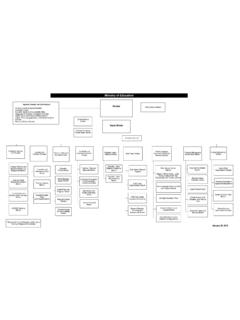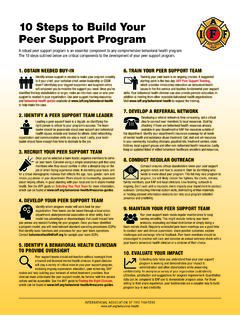Transcription of Mentoring Beginning Teachers: Program Handbook
1 Program Handbook MENTORINGB eginning TeachersiiForeword 1 Introduction 2 Purposes of a Mentoring Program 4 Relationship of Purposes of Mentorship and Stages of Beginning Teacher Development 5 Stages of Teacher Development 5 Basic Assumptions of a Successful Program 6 Dimensions of the Mentor Role 8 Colleagues in Reflection 8 Mentoring Context 9 Roles and Responsibilities 10 Role of the Mentor 10 Responsibilities of the Mentor 10 Role of the Prot g 11 Responsibilities of the Prot g 11 Role of the School Administrator 11 Responsibilities of the School Administrator 12 Roles and Responsibilities of School Districts and Locals 12 The Profits of Mentoring 13 Program Evaluation 15 Evaluation of the Mentorship Program Mentors 17 Evaluation of the Mentorship Program Prot g s 18 Mentors 19 Functions of Mentoring 20 Needs of Beginning Teachers 21 Helping Beginning Teachers with Critical Tasks 22 Mentoring vs Evaluating 24 Table of Contentsii1 Needs Assessment for Mentors 25 Communication and Support 27 The Mentor Traps 29 Phases of the Mentorship Relationship 30 Prot g 31 Starting Points 33 Needs Assessment for Prot g s 37 Lesson Plan Reflection Sheet 38 Reflection for Your Professional Portfolio 40 The Prot g Traps 42 Administrators 43 Responsibilities of Administrators 44 Developing a Mentor Pool 44 The Administrator Traps 45 Further Suggestions for Mentors and Administrators 46 Developing a Mentor Prot g Plan 47 References 49 Appendix A Mentor Prot g Activities 51 Appendix B Websites 54 Appendix C Mentorship and Staff Development Bibliography 56 Appendix D Sample Mentorship Program 67 Appendix E Mentorship Frame of Reference 72ii1 The Program Handbook : Mentoring Beginning Teachers is intended to assist classroom teachers, school administrators, school districts and locals in the development and implementation of a Mentoring Program for Beginning teachers.
2 The Mentoring of Beginning teachers is a critical component of the induction of new teachers into the profession. It makes necessary connections between theory and practice, supports the professional and personal growth of Beginning teachers and provides professional-development opportunities for the mentor Association s mentorship Program grew out of a model project on Mentoring (1996 98) in which the Association partnered with Red Deer City Local No 60 and Red Deer School District No 104. The model project has now grown to include most of the school districts and locals in the province. This Handbook will serve to provide a practical resource for the establishment and implementation of a Mentoring Program for Beginning teachers as well as a resource for sustaining the Handbook was developed by Dan J Garvey of the Alberta Teachers Association, Professional Development Program area. I hope that this publication will be useful to mentors, prot g s and others who are involved in the Mentoring Program for Beginning ThomasExecutive SecretaryForeword23 Learning new curricula, dealing with classroom management and discipline, integrating students with special needs, using technology, individualizing student programs , coordinating extracurricular activities and being accountable to the various stakeholders of education are just a few of the jobs teachers do.
3 Many of these duties are diffi cult for the most experienced professional, so one wonders how Beginning teachers survive, since they are expected, on their very fi rst day of employment, to do the job of a seasoned veteran. Many school districts, seeing a need to nurture the new generation of teachers, have put in place formal mentorship Mentoring (buddy system) is not Mentoring programs must replace informal Mentoring is a nurturing process, in which a more skilled person, serving as a role model, teaches , sponsors, encourages, counsels and befriends a less skilled or less experienced person for the purpose of promoting the latter s professional development. Mentoring functions are carried out within the context of an ongoing, caring relationship between the mentor and the prot g (Anderson 1988).Experienced teachers do not want to educators often do not ask for the help they teachers need to observe new effective teaching Mentoring does not improve teaching over Mentoring programs are diffi cult to identify and is a need to identiify who is obtaining support and the quantity as well as the quality of that described in the model of informal Mentoring (Figure 1) the level of competence of the prot g usually reaches the level of the mentor.
4 This is a result of not going farther than the initial orientation of the prot g . The mentor provides teaching materials, classroom teaching strategies, and unit and long-range plans for the benefi t of the prot g . This could be referred to as an apprenticeship model. The competence level of the mentor does not increase under this model. No refl ective practice is in place, and no action research is carried out by mentor or prot g . Little professional growth of the mentor takes place under this informal or buddy a formal Mentoring process (Figure 2) the prot g not only reaches the competency level of the mentor but grows beyond the established baseline along with the mentor. The mentor may share materials but also goes beyond the sharing and moves into the development of materials within a collaborative team. This requires refl ective practice, collaborative planning and action research coupled with a joint action plan by the mentor and prot g . Through this process both mentor and prot g soar to new heights of professional growth and 1 Figure 2 CompetenceMentorProt g ExperienceCompetenceMentorProt g Experience(Garvey 2000)45 Initial Orientation to Many Challenges New work setting New work culture of school community and organization New curriculum and assessment process Profession Improvement of Professional Practices Effective teaching models, strategies Leadership and management skills Development of the School as a Learning Community Lifelong learning orientation Moving beyond congenial to collegialOverall purpose is toimprove teaching and learning.
5 Purposes of a Mentoring Program45 Relationship of Purposes of Mentorship and Stages of Beginning Teacher DevelopmentStages of Teacher Development Initial Orientation: Learning About the School How do you learn to plan and teach? How do you plan curriculum? How do you manage student behaviour? Improved Professional Practice How do you learn to improve teaching practice? What do you do to make it work better? How do you refl ect- for teaching?- in teaching?- on teaching? Developing a Professional Learning Community What needs to be done to develop a collaborative community of learners? Beginning teachers need to be assisted to move from the Initial Orientation stage through the Improved Professional Practice stage to the Developing a Learning Community stage. This is the purpose and goal of 3 Developing a Learning CommunityImproved Professional PracticeInitial Orientation67 1. Mentoring is the central feature of a successful induction process. 2. Without Mentoring , new staff focus on Orientation and take considerable time to move to the Professional Practice and Learning Community stages.
6 3. Both the mentor and the prot g gain from the Mentoring experience. 4. Mentorship activities, structures and programs can vary widely, from mentor prot g pairs to teams of mentors. 5. Good teachers do not necessarily make good mentors. A different set of skills is needed to work effectively with adult learners. 6. Mentors should be able to volunteer or to say, No, not this year. 7. Learning to be a good mentor takes time. 8. Mentors move from being expert teachers to novice mentors to expert mentors (Figure 4). Training for mentors is needed from one level to the Assumptions of a Successful Program67 Figure 4 Teachers, although expert at pedagogy, fi nd that they become novice mentors they, too, move through a learning cycle in terms of the mentor will need specifi c mentor skills development in order to facilitate the professional growth of the prot g .Expert TeacherExpert MentorNovice Mentor89 Colleagues in Refl ectionFigure 5(Enz 1992, p 74, modifi ed)There are three areas of support for the Beginning teacher.
7 Mentors need to recognize the importance of also being support of the Mentor RoleService Provider OrientationAssistance Provider Collaborator Coach Role ModelSupport Provider Confi dant Advisor Friend89 Mentoring ContextFigure 6 Based on Anderson 1998, p 41,Enz 1992, p 74 Contained in the planning cycle are three areas in which Beginning teachers need assistance: professional, instructional, and personal and Diagnosing Prescribing Evaluating ReportingInstructionalInstructionalProfe ssional Provincial expectations Policies and procedures Roles, rights and responsibilitiesPersonal and Emotional Moral support Befriendment Well-being EncouragementNew Growth PlanFocused Conferencing and CoachingFocused ObservationGrowth PlanConferencing Self-AnalysisLesson PlanningSchool Policies and ProceduresBuilding Trust1011 Role of the MentorMentor teachers are increasingly sought to provide more effective school-based support for Beginning mentorship depends upon clarity of participant roles and responsibilities.
8 Successful programs have shown that mentors should continue to teach while serving as mentors, understand the typical needs and challenges of the Beginning teacher, develop and use a variety of strategies to assist the Beginning teacher, prepare themselves for effective one-on-one consultation with individual teachers, initially focus their efforts in areas known to be difficult for novice teachers, make the accumulated wisdom of other experienced teachers accessible to Beginning teachers and develop strategies for giving acceptance and support for the Beginning teacher within the school of the MentorThe responsibilities of mentors, once matched, are to encourage and support the acculturation of the prot g into the district, prepare and implement a joint mentorship growth plan with the prot g , maintain a relationship with the prot g consistent with the Code of Professional Conduct, model and demonstrate effective teaching strategies, observe and provide feedback to the prot g , assist the prot g in identifying personal strengths and planning for further professional growth, and assist the prot g with curriculum and instructional and Responsibilities1011 Role of the Prot g The role of the prot g is complex.
9 As a Beginning teacher, the prot g is a qualified professional as is the mentor. The difference lies in the repertoire of teaching and management strategies that the experienced, veteran teacher as the role of the mentor is based on a number of understandings, the role of the prot g is based on some key principles. For the most part prot g s still have much to learn about putting their knowledge to work; develop their own teaching styles over time; develop active listening and consultation skills; are committed to an ethos of collegial reflective practice; develop observation and analytic strategies to enhance their teaching effectiveness; provide guidance, support and assistance in analyzing teaching that enhances their own teaching effectiveness; and move through well-delineated stages of development from day-to-day survival to concerns about managing responsibilities to concerns about the impact of their teaching to raising questions about their of the Prot g The responsibilities of the prot g , once matched with a mentor, are to prepare and implement a joint mentorship growth plan with the mentor and maintain a relationship with the mentor consistent with the Code of Professional of the School AdministratorThe role of the school administrator is key in developing a mentorship Program .
10 The school principal is in a position to assign or approve mentor and prot g teams based on the strengths and needs of the school role of the school administrator is to facilitate the process of mentorship within the school. Principals need to1213 initiate mentorship programs based on the needs of the staff, inform potential mentors and prot g s about the process and Program , facilitate the use of time and resources for the mentorship Program and assign/approve mentorship teams early in the school year or at the end of the current year for the following of the School AdministratorPrincipals with staff involved in the Program have a responsibility for facilitating joint growth planning for the prot g and mentor, providing for common release time for the prot g and mentor with either the instructional or the non-instructional requirements of the collective agreement on a regular and ongoing basis, recruiting mentors who meet the identified criteria established by the mentorship steering committee and arranging costs for release time for the mentor and prot g to participate in the Program s large group and Responsibilities of School Districts and LocalsThe district and the local are responsible for establishing a steering committee; promoting the Program in the district (information meeting for principals and interested experienced and Beginning teachers); contributing financial resources to support the mentorship Program ; identifying criteria for selection of mentors; delivering the following common Program of events that make up the inservice component of the Program : orientation meeting for all participants, including principals, mini-conference(s) or workshops, and evaluation and wind-up session for all participants.








